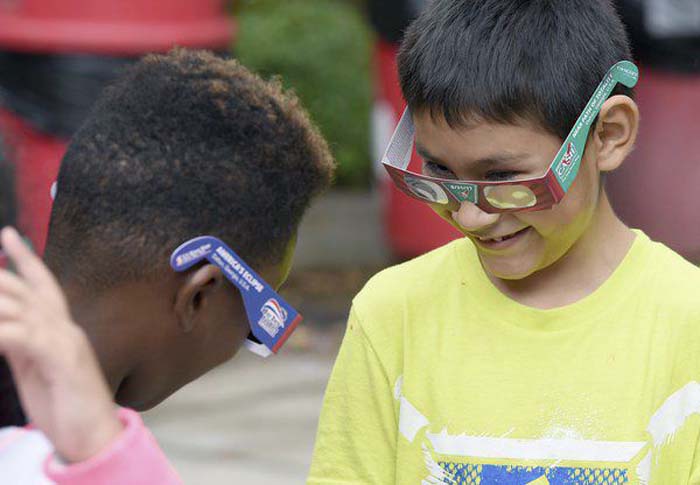Dalton, Whitfield schools prepare students for the Great American Eclipse
Published 10:43 am Monday, August 14, 2017

- Daniel Tavarez, 8, left, and Juan Huitanda, 9, look at one another over their eclipse glasses on Friday at City Park School in Dalton.
DALTON, Ga. — Gracison Saylors has never seen a solar eclipse. A fourth-grader at Westwood School, she wasn’t even born when the last total solar eclipse passed over Georgia back in 1970.
But she says her grandmother has told her what to expect.
“She said the sun will be covered up and all we’ll see is an orange ring,” she said.
Saylors says she’s looking forward to the Great American Eclipse, which will happen on Monday, Aug. 21.
“Dalton will experience a partial eclipse, not a total eclipse, but it (the sun) will still be pretty covered, 99.3 percent,” said Samantha Blair, Dalton State College assistant professor of physics and astronomy.
During a solar eclipse, the moon passes between the Earth and the sun. That means the moon will cover more than 99 percent of the sun when viewed from Dalton, plunging the area into darkness. Blair said the moon will begin to cover the sun around 1:03 p.m. The eclipse will peak, with the maximum surface of the sun covered, around 2:33 p.m., and that will last about two minutes and 31 seconds. Blair said the sun will not be fully uncovered again until 3:58 p.m.
Both Whitfield County Schools and Dalton Public Schools will extend their school day 30 minutes later than usual that day so that students can observe the eclipse together.
Blair says that any given point on the planet experiences a total solar eclipse just once every 375 years, so for many people the chance to view this eclipse will literally be a once-in-a-lifetime event.
The last total solar eclipse visible from any part of the continental United States was 1979. The next one will be in 2024. It will follow a path from Texas to New England.
Local schools are already working to get students ready for the Aug. 21 event.
“We had a training day on Aug. 3, a professional learning day,” said David Thacker, middle school curriculum director for Whitfield County Schools. “We had the opportunity to work with a trainer for NASA. She did a videoconference with the (middle school) teachers. She shared a number of resources that NASA has developed that are free for teachers.”
The resources provide a number of activities for teachers to do both on the day of the eclipse and leading up to it. Teachers are free to choose which ones they wish to do.
Elementary schools have also been busy getting their students ready.
“We’ve been talking about it, trying to get them ready for it,” said Hannah Talley, a media specialist at City Park School.
At that age, teachers say, emphasizing safe viewing is important.
Staring into the sun can cause eye damage, and Blair says the eclipse should only be viewed through a telescope or binoculars that have a solar filter or through special eclipse glasses. Many stores are currently selling glasses they say are eclipse glasses. But Blair said people should make sure the glasses are ISO (International Organization for Standardization) certified. People can also view the eclipse with a pinhole projector, a card with a small hole through it, to project an image of the sun.
Check Into Cash, Buy Here Pay Here USA and U.S. Money Shops donated 43,000 eclipse glasses to six school systems including Dalton and Whitfield.
“We are really grateful for their generosity,” said City Park School Principal Jason Brock. “This is really going to be a special day for students.”
Several students at City Park got to try on those glasses for the first time on Friday.
“I can’t see anything,” said third-grader Fernanda Salaices, who said she thinks they will keep her eyes safe from the sun.
Brock says there are some parents who, for safety concerns or cultural reasons, don’t want their children to go outside to view the eclipse.
“We will livestream it in our auditorium so they can see it on a big screen,” he said.
That night will also be City Park’s family night, starting at 5:30, and it will contain a number of events and activities with an astronomical theme.
Westwood School fourth-grade teacher Stephen Gregg says students there will go out at different points during the eclipse to observe what is going on, then come back in and make a drawing of what they saw and write down what they observe. The goal is for them not only to learn about the eclipse but to produce a keepsake of the event.
Michelle Caldwell, elementary curriculum director for Whitfield County Schools, says teachers and administrators at each school will be making their own decisions on how to prepare students for the eclipse.
At Dug Gap Elementary School, for instance, fourth-grade teacher Melanie Erwin has been doing an eclipse countdown since the first day of school.
“Each day the students have a 10-minute lesson to learn about the upcoming eclipse,” Caldwell said. “The daily lessons will continue up to the day of the eclipse. The anticipation and excitement are growing.”
A few years ago, an anonymous donor gave Antioch Elementary School funding for a Starlab, a portable planetarium, and teachers there are using it to teach students about what happens during an eclipse.
In addition, several schools plan to serve MoonPies and Krispy Kreme “eclipse” doughnuts (special edition doughnuts covered completely in chocolate) on the day of the eclipse.





